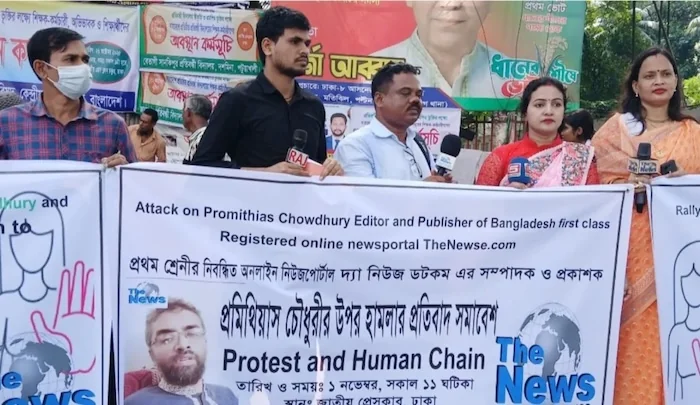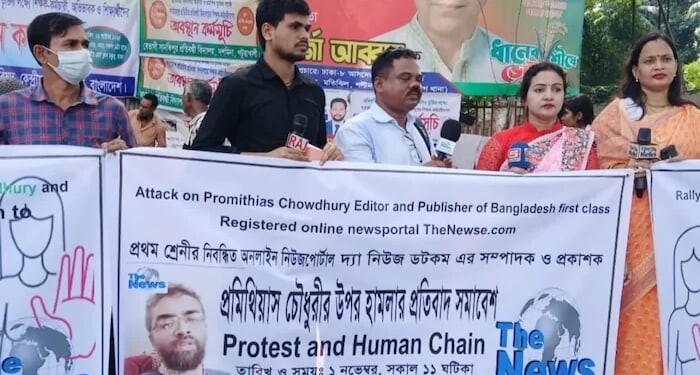
Order Michael Finch’s new book, A Time to Stand: HERE. Prof. Jason Hill calls it “an aesthetic and political tour de force.”
Sign up to attend Michael’s talk in Los Angeles on Thursday, November 20: HERE.
Towards the end of October 2025, a Bangladeshi Hindu journalist, Trina Roy Choudhury, known for her investigative work on violence against minorities in Bangladesh, received a series of violent threats and attacks that reveal alarming risks for press freedom in Barishal, Bangladesh. Her husband, Promithias Chowdhury, was assaulted on October 29 at a local shop in Barisal that a man identified as Nazim Mulla owned, while Roy herself received explicit threats of sexual violence, including being told that a Muslim gang would “gang-rape” her in direct retaliation for her reporting.
It is worth noting that Mulla was Chowdhury’s friend. But during the attack, Mulla refused to recognize their friendship. Speaking to Indian outlet OpIndia, Roy recalled that when Promithias reminded them, “I am your friend,” the attackers replied, “You are a kafir Hindu, how can you be a friend? Bangladesh belongs to us; we are letting you stay here out of mercy. Get out of Bangladesh.”
Roy’s reporting, which preceded the threats, centered on attacks on Hindu communities, desecration of Hindu temples, forced conversions, and mob violence in across Bangladesh. Her work had appeared in the online portal The News, and had drawn the ire of local Muslims, who viewed the coverage as undermining their ideological narrative.
In the hours following the assault on her husband, Roy’s newsroom received calls and social media messages demanding she stop publishing “anti-Muslim” or “anti-Islam” content. The threats escalated into a public circulation of her personal details and a video of the assault, which activists say was aimed at intimidating not just her, but all journalists covering communal violence.
Despite repeated pleas to local police, Roy and her husband allege that law enforcement officials refused to take protective action. She further alleged that police threatened to file counter-cases accusing the couple of “inciting communal unrest,” rather than offering to register a formal First Information Report (FIR). The couple added that officers appeared reluctant to confront the perpetrators, alleging the attackers had links with Islamic jihad-linked organizations.
The attack on Trina Roy’s husband, the violent threats issued against her, and the inaction of the police bear an unsettling resemblance to the 2015 murder of Bangladeshi-American writer and human-rights activist Avijit Roy, whose killing became a global symbol of the dangers that secular voices face in Bangladesh. Roy, a prominent writer born into a Hindu family in 1978, had founded the platform Mukto-Mona. He used this platform to speak out extensively against Islamic jihad and advocate for a scientific perspective and minority rights. His work made him a target for Islamic jihad groups.
On February 26, 2015, while leaving a book fair in Dhaka with his wife, machete-wielding Muslims attacked Roy on a crowded street. They hacked Roy to death in public, while his wife was gravely injured and left with two severed fingers. In a later BBC interview, the latter recalled how police officers were standing just meters away, but refused to intervene as the assault unfolded. Bangladesh is once again witnessing a dangerous repeat of the conditions that enabled the murders of secular writers a decade ago.
On November 3, 2025, journalists’ associations in Bangladesh held a human chain demonstration outside the Barisal Press Club, demanding the immediate arrest of the named attackers and formal updates on the investigation. While the threats and assaults have been publicly documented, there is no publicly available record of arrests related to the case in mainstream Bangladeshi media or formal investigative updates from the Bangladesh police. Bangladeshi mainstream media has also refrained from covering the attacks on the Hindu journalist couple, which only drew attention to how all institutions in the Muslim-majority south-Asian country sideline minority well-being, safety, and rights.
Despite the gravity of the case where a woman journalist from a vulnerable minority was threatened with gang-rape in a Muslim-majority country, the incident has received no traction in either the national Bangladeshi media or the international press. While cases involving attacks on journalists elsewhere prompt strong and immediate responses from international organizations, think-tanks, and prominent newsrooms, the threats against Trina Roy Choudhury have remained confined to a handful of regional outlets and social media testimonies. Not a single major global press freedom organization, foreign correspondent network, or international feminist journalistic collective has issued a public statement, leaving her without the solidarity that is routinely extended to journalists facing gendered or political violence in other parts of the world, because clearly exposing Islamic jihad is not on their agenda. Their indifference demonstrates their selective outrage, geopolitical sensitivities, and the uneven attention given to minority-rights abuses when the victims do not fit into globally resonant narratives of forged and mostly fake tales of Muslim victimhood. If the victim is not Muslim but the assailants are, all their liberal agencies resort to shameful silence, if not brushing off the case under the rug.

















